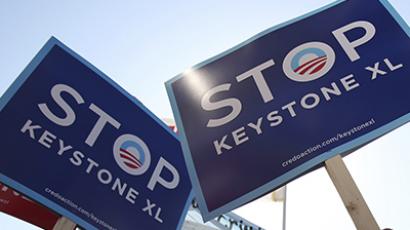State Department says hotly contested Keystone XL won't have 'substantial impact'

Despite stark warnings from environmental groups and politicians over the proposed Keystone XL pipeline, a new State Department report calls the project environmentally sound. A top US environmental group says the report is the result of "malpractice."
The March 1 Draft Supplementary Environmental Impact Statement
says the pipeline “is unlikely to have a substantial impact on
the rate of development in the oil sands, or on the amount of heavy
crude oil refined in the Gulf Coast area,” where the pipeline
is set to end.
"Spills associated with the proposed Project that enter the environment are expected to be rare and relatively small," the report said.
The report is called a draft because the public is given 45 days
following its publication to weigh in on the findings, after which
the State Department will respond and then finalize its
report.
After the public feedback period closes, the agency says it will
“conduct a separate analysis of whether the project is in the
national interest, a question on which eight other agencies will
offer input over 90 days.”
US President Barack Obama will most likely not make a final decision on the pipeline until “mid-summer at the earliest,” the report says.
The Keystone XL is a hotly contested oil pipeline that, if completed, would run from central Canada down through nine US states before reaching the Gulf Coast in Texas.
According to ThinkProgress, lobbyists spent $178 million in 2012 alone trying to buy influence in Washington for the pipelines' backers.
Since its proposal in 2008 and approval in 2010, the pipeline plan has been the subject of fierce criticism from environmentalists and politicians alike over the risk of oil spills on the sensitive ground the pipeline is set to cover, as well as the massive projected greenhouse emissions.
"The annual CO2e emissions from the proposed Project is equivalent to CO2e emissions from approximately 626,000 passenger vehicles operating for one year or 398,000 homes using electricity for one year,” the State Department report says.
The Sierra Club, one of the oldest environmental protection groups in the US, released a statement in response the same day.
"We’re mystified as to how the State Department can
acknowledge the negative effects of the Earth’s dirtiest oil on our
climate, but at the same time claim that the proposed pipeline will
‘not likely result in significant adverse environmental effects.’
Whether this failure was willful or accidental, this report is
nothing short of malpractice," it read.














